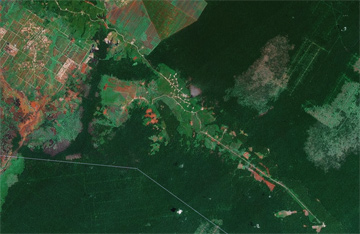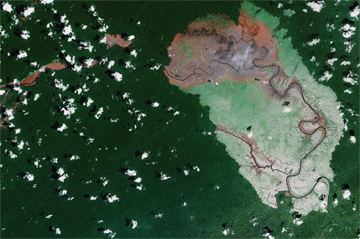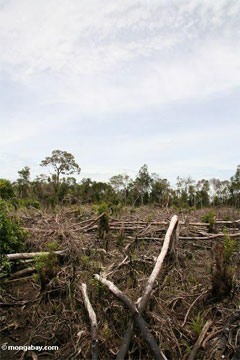Australia’s largest retailer Woolworths greenwashes rainforest destruction in Indonesia, allege activists
Australia’s Woolworths greenwashes rainforest destruction in Indonesia, allege activists
Jeremy Hance, mongabay.com
July 8, 2008
Despite a year of protesting, Woolworths continues to carry paper sourced from ‘the worst fibre manufacturer in the world’.
|
|
Woolworths Limited is Australia’s largest retailer and the world’s 25th largest; it is also the only Australian company to make into the top twenty-five. It is the “Wal-mart of Down-Under”. And much like Wal-mart, Woolworths has lately attempted to become more green. Though, according to a recent campaign entitled “Wake Up Woolworths”, this is merely the worst in greenwashing.
The focus of the campaign is Woolworths relationship with Asia Pulp and Paper (APP). APP has a notoriously bad environmental record. It has been caught performing illegal logging in China and Indonesia, and although the company promised to clean-up its act, last year the Financial Times reported that in 2004-2005, 70 percent of APP’s logging was in natural forests.
“They have been among Asia’s most serious tropical forest converters,” said Tim Woods from the Wake Up Woolworths campaign, “stripping millions of hectares of diverse forests and replacing them with pulpwood plantations that the significant mammals of the region — tigers, elephants, orangutans and the like — cannot survive in. Much of that logging was unsustainable and the logs were laundered into Malaysia with locals instead of the company being blamed.”
 Logging and oil palm plantations in Sumatra.  Large-scale deforestation in Sumatra. Images courtesy of Google Earth and the NASA Earth Observatory |
“Along the way they have removed indigenous people from their lands are reported to regularly fail to pay even the low Indonesian minimum wage,” he continued. “APP are widely considered to be the worst fibre manufacturer in the world, are treated as embarrassment by other companies and have earned their reputation for being ‘triple bottom line unsustainable.'” The company has been accused also of financial mismanagement and opportunism.
Many companies and NGOs have been cutting ties with APP due to its failure to improve its environmental standards. WWF has been supporting boycotts of APP products for nearly five years. In February of last year The Rainforest Alliance ended a partnership with APP, while in November the Forest Stewardship Council (FSC) also dropped APP. Most recently, American office giant Staples stopped carrying APP products.
Woolworths however, despite protests and negative media attention, continues to carry APP products. “They said they would look into allegations,” Woods said. “After that they stated they are committed to a review of their supply arrangements. But one year on, the APP made product is still on the shelves and Woolworths has continued its refusal to meet and even discuss the matter.”
Woolworths purchases APP for its company label, called ‘Select Brand’. According to Wake Up Woolworths campaign, before 2007 ‘Select Brand’ carried stickers stating that the product was produced from ‘sustainable forest fibre’ which was ‘sourced from a certified environmentally managed company that is environmentally, socially and economically responsible’. When confronted with the issue, Woolworths kept the products on the shelf but covered over the sticker stating its ‘sustainability’.
Tim Woods, when asked if he believed that Woolworths was deliberately misleading the public, he replied that “yes, unfortunately I do.” He continued: “Woolworths didn’t just accept a label from APP, they made their own. They made up their own bogus sustainability logo as well and they stuck it onto the products as a point of difference with other products. They engaged in serious greenwashing because they say they checked the products and certifications before they labeled them. The fact is that Australia’s competition regulator stated after their independent investigation that Woolworths was unable to prove the source of their products or the veracity of any of their claims.”
 Slash-and-burn agriculture in Kalimantan on the island of Borneo. Photo by R. Butler. |
In 2007 Woolworths announced a sustainability strategy to carry it through 2015. Although, the plan carries several strategies to lessen the company’s carbon footprint, it does not include any plans regarding the company’s role in tropical deforestation, although such deforestation makes up 15-20 percent of the world’s annual carbon. There is no mention of APP in the report, either. In the report Woolworths does claim that the consumers choices are largely external to the company: “Consumer preference and purchasing behavior is determined by a range of factors, most of which are outside our direct control.” Woods disagrees, “They (Woolworths) drive consumer behavior and carefully manipulate it. Hiding behind consumers as all informed and self directed participants who tell Woolworths what to do is nonsense. An example demonstrates the point more than adequately. If Woolworths did not stock any products made by APP would consumers be contacting them demanding that they do so? Of course they would not.”
Woods believes the issue is purely a matter of profit: “The reason they use APP product for their private ‘Select Brand’ label is because its cheap and they make higher margins. To them that’s what seems to be sustainable. If they put anything into their sustainability plan about APP they would be obliged to do something, so failing to identify the problem avoids the necessity to act in their minds.”
Woolworths was contacted to comment on this article, but did not reply.